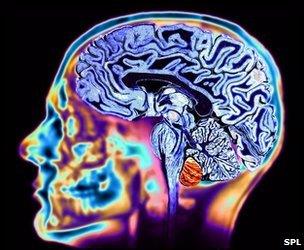MRI brain imaging pinpoints deception
- Published

Our ability to project a picture of ourselves in other people's minds may be down to a distinct form of brain activity, according to a report.
A US team used functional magnetic resonance imaging to observe the brains of people playing a strategic game.
They write in the journal PNAS that those who tried to trick their rivals showed a unique brain activity.
The report says this could help shed light into what goes on in the minds of people with mental disorders.
"The study is a way to probe the way that we think how other people think about us," Read Montague of the Baylor College of Medicine in Houston, US, a co-author of the paper, told BBC News.
Mental models
To explain the idea of this so-called second-order belief, or "the ability and willingness to manipulate other people's beliefs about ourselves for gain, Dr Montague used an example of a typical job interview.
"People send signals to one another to manage our image in the minds of others.
"You send a resume in that creates a prior set of dispositions about you, then you walk into an interview and you say things in order to manipulate in the mind of the interviewer a model of you in their mind.
"That's second-order belief."
To get the results, the team, led by Meghana Bhatt, also of the Baylor College of Medicine in Houston, asked 76 participants to play a strategic computer game.
'Strategic deceivers'
It seemed simple, but the players executed it differently, with some of them showing signs of a "strategic deceiver" - a person who bluffs.
During the game, "buyers" had to pass on information about an object's value to the "sellers", in order to buy the object as cheaply as they could.
"Somebody sends a suggestion to you, saying 'You should sell me this thing for such and such amount of money', and the other person has to decide what that person means by those signals, what does that person think I think about them," explained Dr Montague.
The team found that about 11% of the players consciously tried to deceive their opponents by making them believe they were being honest - thus aiming to reap higher profits.
The researcher said that this study was an important step towards understanding mental disorders, including autism.
He explained that people with personality or mental disorders did not process social information appropriately.
But asking a person with a mental illness to play a strategic computer game could help provide insights into a specific disorder.
"Right now we have no understanding of mental illness at all," said Dr Montague.
"We have opinions of physicians in clinical settings; we have the obvious incapacities of people where they can't have normal lives.
"But we haven't had objective procedures where we can access therapies or drugs.
"So this is a step in that direction and this is going to allow us to identify genes associated with these disorders too."
- Published11 May 2010
- Published12 March 2009
- Published9 February 2007
- Published30 November 2004
- Published15 November 2007